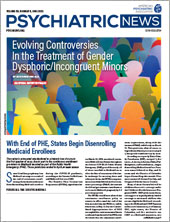In season 2, episode 5 of “Euphoria,” Leslie Bennet, the mother of the series’ protagonist, Rue Bennet, confronts her daughter regarding her relapse on opioids. Rue devolves into an emotionally abusive tirade, placing responsibility on all in her path and culminating in her running away from home to evade admission to a rehabilitation center. Following a series of chaotic events, Rue returns home to the care of her mother and sister. It’s at this stage that we are given an opportunity to glean the perspective of those most directly affected by her substance use: her family.
We see her sister, Gia, reconciling how to support Rue with her dwindling faith in Rue’s potential to recover. Her mother must reconcile these feelings as well, with the added challenge of not alienating Gia in the process. In the final scene, Leslie is pleading with an inpatient rehabilitation facility, requesting a bed for Rue out of fear that Rue will kill herself if left as an outpatient. At this moment she emphatically and repeatedly states, “Please don’t do this to us.”
While many television shows attempt to portray life with a substance use disorder (SUD), few capture the deleterious effects that these disorders have on one’s relationships. Family members experience higher rates of medical and psychiatric comorbidities, directly correlated with the severity of our patients’ SUD. While a majority of patients are in contact with family at the point of entering treatment, the strain on these relationships brought on by substance use can inhibit integration of family members into the treatment.
Yet engagement of patients’ families is critical in both initiation and continuation of patient care. Management of SUDs within the adolescent population presents special considerations, particularly regarding patient engagement, alliance, and confidentiality. If they are involved, families can monitor and report on the patient’s behaviors, perform in-the-moment interventions, and even provide at-home withdrawal management, as displayed on the series. A 2018 meta-analysis published in the Journal of Clinical Child & Adolescent Psychology found that ecological and behavioral family-based therapies improve patient engagement and the therapeutic alliance. There was also a decrease in rates of externalizing behaviors, serious crimes, and arrests.
Although we don’t follow Rue into adulthood, we get a glimpse into how life may progress through her sponsor, Ali. Ali is a middle-aged man with multiple SUDs, raised in a household with parental substance use and domestic violence. His battle with substance use began in adolescence, inevitably leading to conflict throughout adulthood, particularly in his family life. His reported low points involved domestic violence, divorce, incarceration, and estrangement from his children. His depiction is one of a sympathetic and reformed character, flawed in just the right way to aid our young protagonist. The story of Ali is not uncommon to both providers and patients alike. In spite of the negative life events he has experienced, he manages to engage in treatment and achieve years of sustained remission.
I wonder how things would have differed if Ali and his family had received treatment earlier in his clinical course, perhaps with the community reinforcement approach and family training (CRAFT) intervention. CRAFT aims to engage families and/or significant others, with the following goals: providing substance use education, teaching effective communication skills, rewarding positive behaviors, and encouraging treatment-seeking behaviors. This intervention may have led to an earlier, sustained remission for Ali, with the potential benefit of allowing his family to maintain healthy relationships.
“Euphoria” not only tackles adolescent substance use, but also the overall increased complexities of adolescent life in the present age. The show attempts to portray the relationship between loved ones and teens who have SUDs, balancing trust, love, support, altruism, frustration, and resentment. In response to Gia’s skepticism of Rue’s renewed commitment to sobriety, Ali states, “I don’t think it’s a question of support. When you’ve let someone down again and again, I think it’s fair to lose a little faith.”
It becomes our responsibility as providers to align with families, providing psychoeducation and resources, with the goal of rebuilding their faith in loved ones and ultimately improving outcomes for patients and families alike. ■

